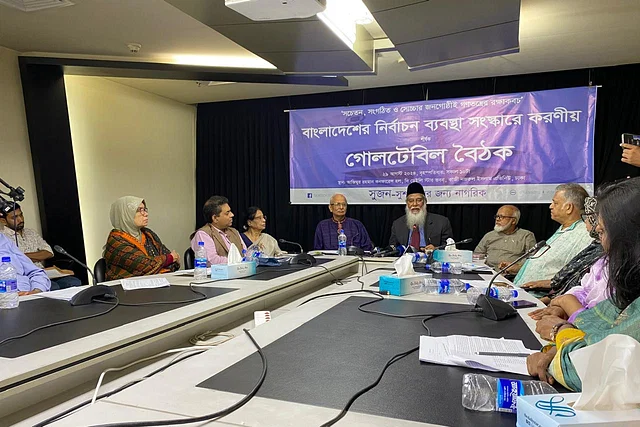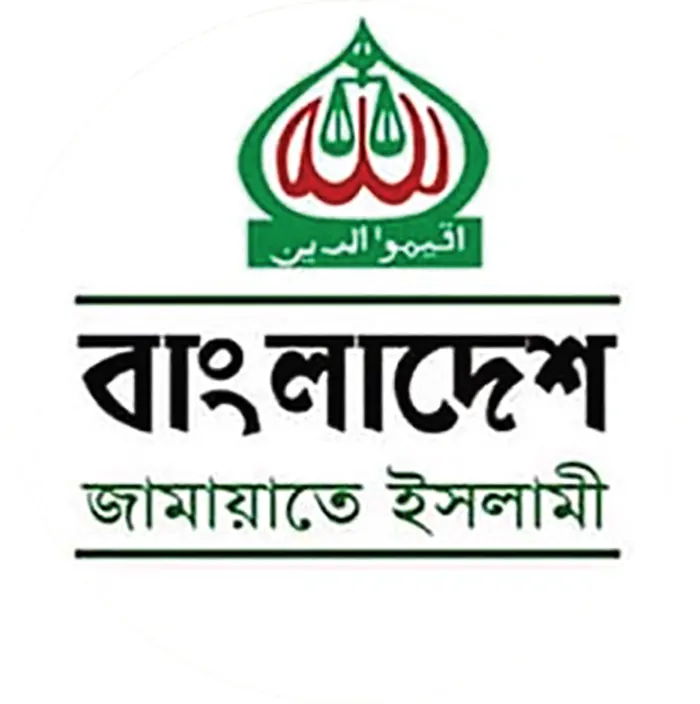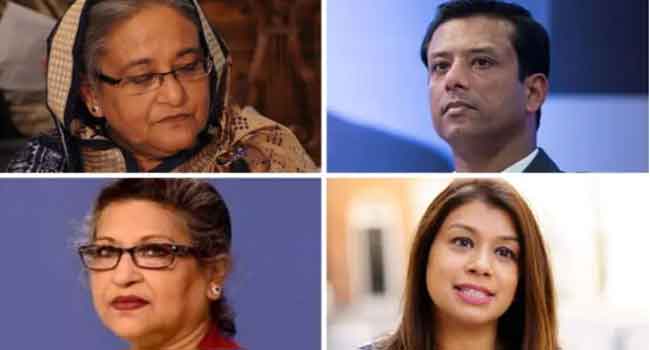Election experts have opined that following the end of authoritarian rule through the student and public movement, a new opportunity has emerged to establish democracy in the country. To establish a credible election process and democracy, a caretaker or interim government must be incorporated into the constitution.
This opinion was expressed by speakers at a roundtable discussion titled “Reforming the Electoral System in Bangladesh,” organized by Citizens for Good Governance (Sujan) at the Azimur Rahman Conference Hall in the Daily Star building in the capital this Thursday morning.
At the beginning of the discussion, tribute was paid to all the martyrs of the anti-discrimination student movement, and prayers were offered for the quick recovery of the injured.
The roundtable was moderated by Sujan’s central secretary, Dr. Badiul Alam Majumdar. He stated that, following the student and public movement, a press conference was held by Sujan on August 11 to highlight various aspects of state reform. In continuation of this, it has been planned to hold separate roundtable discussions on each aspect of the reform. The first meeting is focused on electoral system reform. Sujan has prepared proposals on what needs to be done in this regard. In addition, a new draft of the Election Commission Formation Law and the candidates’ affidavits has been prepared. Opinions from experts will be gathered through both the roundtable and online discussions to present final recommendations to the interim government.
Former Justice and Chief Election Commissioner (CEC) Abdur Rouf said at the roundtable, “We have no alternative but democracy.” He added that through this movement of young students and the public, he sees a glimmer of hope at the end of his life for the end of authoritarian rule. He feels inspired and hopeful that something good will come out of this.
Abdur Rouf stated, “It cannot be that every few years a dictator comes, and then ordinary people have to give their lives and shed blood to remove him. This movement should put an end to this cycle once and for all.”
For fair elections, Justice Rouf emphasized involving voters in the election process. He also proposed ending the nomination system, saying, “The practice in politics where one buys a party nomination for 20 crore taka and then spends another 20 crore taka in the election to become elected and makes 200 crore taka in five years must stop.”
Local government expert Tofayel Ahmed said that without political will, neutral elections are not possible. Measures should be taken to incorporate the caretaker system into the constitution. Additionally, there is a need for a bicameral legislature in our country. That way, even if someone wins a majority, they won’t be able to pass laws as they wish. The major political parties do not want this because they think it would harm their interests.
Tofayel Ahmed pointed out that sometimes a party can win the government with just 30% of the votes while securing 60% or more seats, thereby ruling over 70% of the population. He suggested changing this system to require at least 51% of the votes to be elected. Additionally, even if dual citizens can vote, they should not be allowed to run in elections.
FEMA Chairperson Monira Khan said that the main task of an interim government would be to form a good Election Commission to hold credible elections. The Election Commission should be accountable to the people, with transparency and accountability. For this, the Election Commission could be formed based on public opinion if necessary.
Former Election Commission officer Jesmin Tuli stated that in the past 53 years, there have been 12 national elections, but only four elections held under a caretaker government were considered relatively fair and acceptable. She emphasized the need to close the loophole that allows for getting away with wrongdoing, as it would bring the expected change.
Former Election Commission officer Dr. Abdul Alim stressed the importance of institutionalizing the election monitoring process for fair elections. He said that there should be a strong monitoring system to evaluate how the elections were conducted.
Prothom Alo’s Joint Editor and poet Sohrab Hasan said, “The reason we are experiencing public uprisings is that we are unable to conduct fair elections. We need to develop a democratic mindset.” He questioned why the administration could remain neutral for three months during the caretaker government but not maintain that neutrality for the remaining four years and nine months.
Information technologist Faiz Ahmed Tayeb said the voter list should be digitized. It should include the birth certificates, nationality certificates, and other information for the voter and all members of their family. Additionally, software is needed for announcing the results. A decision needs to be made on whether Electronic Voting Machines (EVMs) will be used, and if so, how.
Aminul Islam, a leader of the anti-discrimination student movement, said, “No election can take place while maintaining the existing electoral system. A new proposal is needed. Measures should be taken to ensure that the winners have the support of the majority of the people.”
The discussion also included contributions from journalist Abu Saeed Khan, Professor Robayet Ferdous of Dhaka University, and Sujan’s Joint Secretary Zakir Hossain.
Sujan’s central coordinator, Dilip Kumar Sarker, presented the written proposals at the roundtable. After the designated speakers’ discussions, the event concluded with an open discussion session.









